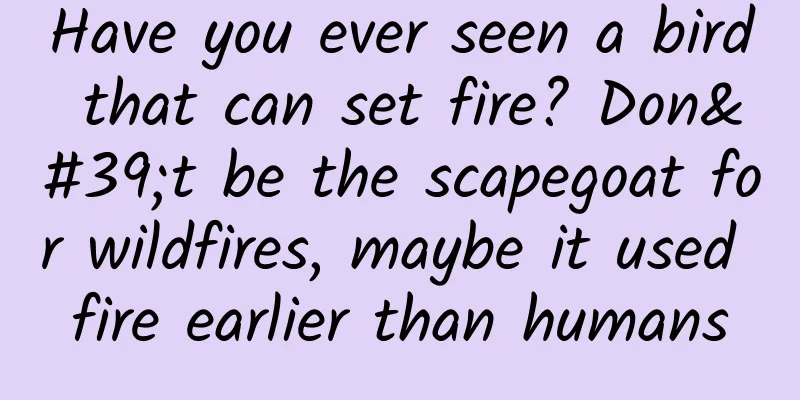Have you ever seen a bird that can set fire? Don't be the scapegoat for wildfires, maybe it used fire earlier than humans

|
Today we are going to talk about birds that travel with fire. In the history of human civilization, the skillful use of fire can be said to be a milestone, which enabled our ancestors to achieve qualitative breakthroughs in diet, living conditions and defense against wild animals. For animals, fire is a very scary thing and often means danger. However, there are a few birds that are not afraid of fire and benefit greatly from it. In recent years, everyone may be familiar with the wildfires in Australia. The long-lasting wildfires have brought disaster to many animals in Australia, including the koalas that we are very familiar with. Some media reported that some birds of prey, such as black kites and sooty kites, would hold branches that have not been completely burned in their mouths or claws, fly to places hundreds of meters away that have not yet caught fire, put down these branches and set them on fire, and then they would wait nearby, waiting for the fire to start, and other small animals would escape from the fire, and they would catch them at this time, thus profiting from the situation. Using fire to improve their hunting efficiency is not unique to these Australian birds of prey. Similar things also happen on the African savannah. When there is a grassland fire, some birds living on the grassland, such as white storks, falcons, and some insectivorous birds, will also stay near the burning grassland, waiting for an opportunity to hunt insects, birds or other small animals that escape from the fire. A research team conducted a fire experiment in Zimbabwe and found something very interesting. There was a fork-tailed drongo near their experimental site. It was a small black bird. This bird would pick up burning branches and put them in other places that were not on fire. As a result, the researchers who were originally conducting the fire experiment ended up spending a lot of energy to put out the fire. The fork-tailed drongo is very smart. It would repeatedly set fires, which gave the researchers a headache. They observed that fork-tailed drongos would stay next to the burning grass and hunt insects flying into the air at any time. Many birds benefited from these fires. Considering that birds have a longer evolutionary history than humans, they may have discovered the magical effect of fire earlier than humans. How should we understand these phenomena? Are these birds smart enough, or is this matter not as complicated as we think? From the perspective of animal behavior or animal cognition, we can say that these birds have discovered the connection between fire and their food, and even that they may have figured out the causal relationship, and this knowledge is not limited to certain individuals, and may have begun to spread among many individuals in the local area. However, this does not require particularly complex cognitive abilities, or advanced cognitive abilities. It actually still belongs to the category of associative learning. In fact, many birds have the ability of associative learning. Under laboratory conditions, birds can complete many tasks with the help of associative learning. However, for birds living in the wild, they may not necessarily have the opportunity to stimulate their associative learning ability in their living environment. In addition, the reason why these birds are not afraid of fire is also due to their ability to fly. When these fires come, they can also escape quickly, so there is no need to worry too much about their own safety. At this point, some people may blame the birds for the expansion of fires, but if they do so, it may be a bit like letting birds take the blame. After all, there are still very few birds that have been found to set fires, and only a very small number of individuals. The main reason for the expansion of wildland fires in Australia and Africa is still factors such as natural fire and dry environment. We don’t need to worry that these birds will expand these skills in other places after mastering the skills of setting fires. After all, their IQ has not reached such a high level. And other places may not necessarily have the opportunity or environmental conditions for them to carry forward their skills. However, here is a small reminder for everyone, especially for smokers. When you finish smoking and throw away cigarette butts, you must extinguish them before throwing them away, because some birds, especially those living near our human settlements, will really use cigarette butts to build nests when they build nests. There have been reports that magpies’ nests caught fire, and the ultimate culprit was the unextinguished cigarette butts. After the magpie catches fire, it will further cause the trees where it is located, and even the electric towers, to catch fire, which will also bring certain dangers to our lives. Therefore, it is very necessary to take precautions before it happens, after all, birds have not yet learned to make fire by themselves. Author: Hu Yunbiao Reviewer: Huang Chengming (Researcher, Institute of Zoology, Chinese Academy of Sciences) Produced by: China Association for Science and Technology Department of Science Popularization Producer: China Science and Technology Press Co., Ltd., Beijing Zhongke Xinghe Culture Media Co., Ltd. |
<<: Are bees also "doing early childhood education"? Scientists tell you
>>: Changman | Can a "cow" also detect diseases? What is a γ knife?
Recommend
Google re-emphasizes upgrade policy, most Android devices continue to be excluded from updates
[[127122]] Due to the large amount of code that n...
Data Brother Qianchuan practical online advanced course video
Data Brother Qianchuan practical online advanced ...
Real men don't wear sunscreen? The skin peeling off from the sun makes you tear it up
Image source: Weibo screenshot gossip Recently, t...
Project release and deployment
Pre-publishing setup Since the new version of ASP...
Are you afraid of the strong confession from the APP?
Different people have different ways of expressin...
Where do your nasal and throat swab samples go? One picture to understand!
Editor-in-charge|Zhai Qiaohong Editor|Jiang Yue S...
Tik Tok e-commerce marketing system!
Relying on a huge content ecosystem and interest-...
Why do some missiles have to be erected before they can be launched?
The earliest truly modern missile, the German V-2...
Dragon Head Secret Agent White Horse Secret Agent Zhong Zhan 27th Quantitative Science Dragon Catching Special Forces
Dragon Head Spy White Horse Spy Zhong Zhan 27th Q...
Why do most people not remember anything before the age of 3?
Friends Try to recall Do you remember what happen...
China Automobile Dealers Association: Analysis of China's imported automobile market in April 2022
(I) Supply: After three years of decline, automob...
iOS 11.2 will enable free trial apps
November 7 news As we all know, in the Windows Ap...
What "gem" made the pigment artist go to Ailao Mountain alone? Experts: Not suitable for pigment making
"A small blue mineral, very beautiful... a s...
Can a short video startup monetize if it has a lot of fans? Are short video fans important?
Can a short video startup monetize if it has a lo...
21-day life planning training camp, how about the 21-day training camp?
21-day life planning training camp, how about the...









